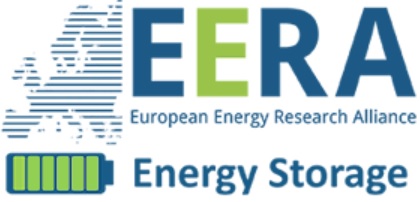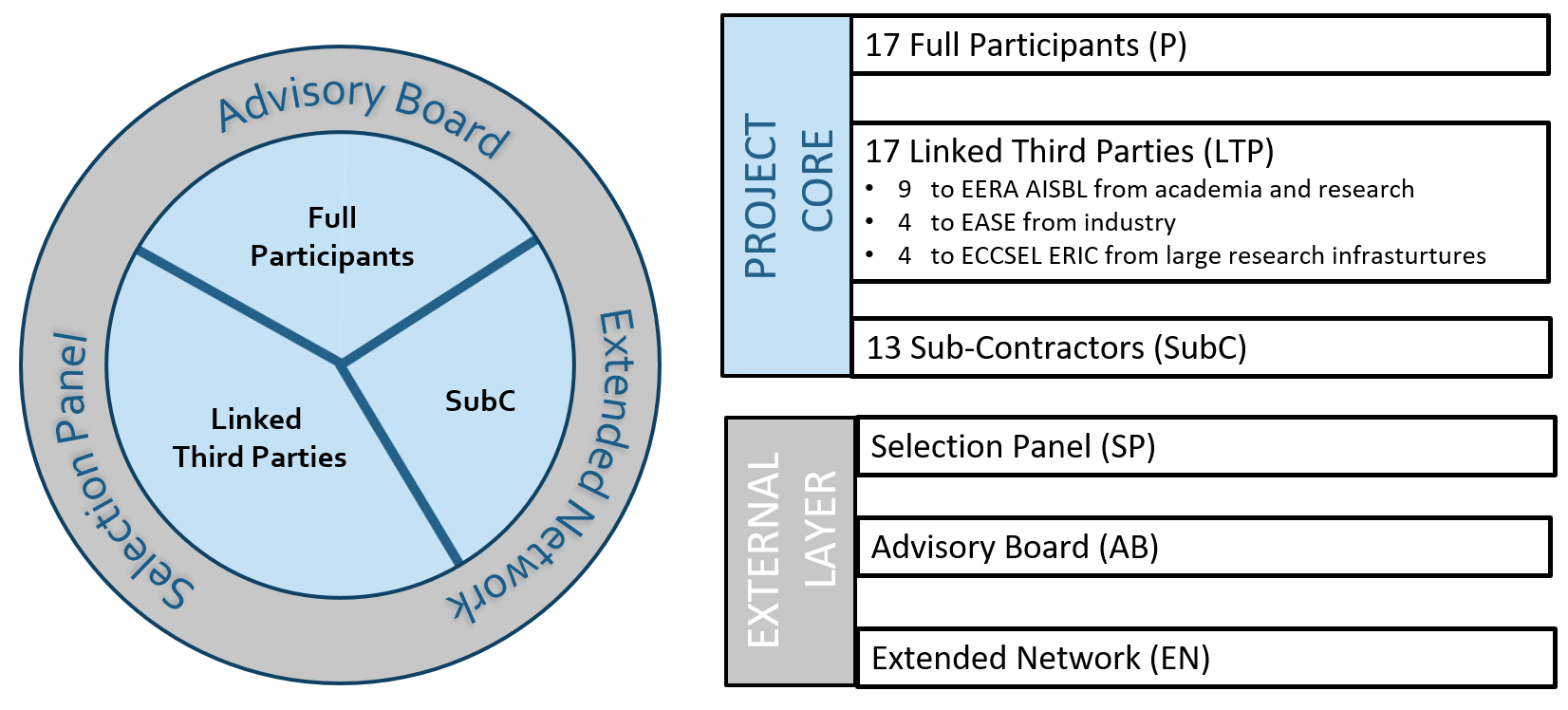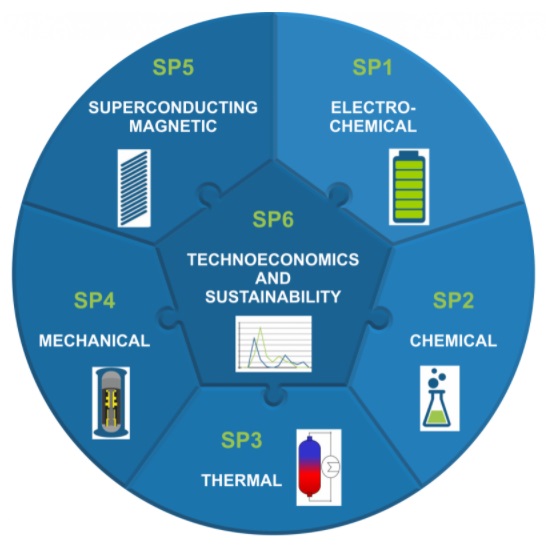July 26th, 2021

HIU director Passerini coordinates new European research project
As the largest European energy research association, the European Energy Research Alliance (EERA) was able to set another milestone in the direction of “climate neutrality”.
Under the coordination of HIU director Prof. Dr. Stefano Passerini the research project “Storage Research Infrastructure Eco-System” (StoRIES) is now set up. StoRIES will officially start on November 1st, 2021. The project is an importnant element of the “EERA Joint Program Energy Storage (JPES)”. “From StoRIES we expect a functioning ecosystem in which we can get to market-ready storage solutions more quickly. Scientists with different research focuses are working in this innovative ecosystem together with the industry on hybrid energy storage technologies that correspond to the new environmental policy framework”, coordinator Passerini said.
? The @EU_Commission has adopted today the #Fitfor55 Package, a set of proposals to make the EU’s climate, #energy, land use, transport, and taxation policies fit for reducing net greenhouse gas emissions by at least 55% by 2030.
Learn more here: https://t.co/XEVvTJ2YV8 pic.twitter.com/gwRFztyuTH
— EERA (@EERA_SET) July 14, 2021
Energy storage systems are essential for the energy transition in order to regulate the fluctuations in renewable energies or to absorb excess energy, keep it ready and feed it back into the grid when it is needed again. “Unfortunately, there is not a single storage technology today that is up to this challenge on its own and at the same time offers ideal performance, sustainability and costs,” says Dr. Myriam Gil Bardají , JPES manager since 2015. The program manager rather sees a combination of different energy storage technologies (electrochemical, chemical, thermal, mechanical and electrical storage) as necessary in order to provide the expected performance in terms of capacity and the to offer the desired flexibility. “The EERA-JPES is the first pan-European program that brings together all the important areas of energy storage research and has thus made the StoRIES project possible,” says Gil Bardají.
The StoRIES project aims to bring together cross-research scientific institutions such as technology institutes and universities with industrial partners in order to jointly develop storage solutions for new technology markets. The focus is on interdisciplinary cooperation: “The merging of know-how within science and industry opens up synergies that are often underestimated,” says Passerini. “At the same time, we would like to focus research on energy storage systems more holistically and add socio-technical and ecological aspects. With the European Green Deal 2050, politicians are giving us an immense homework that we can only do together.”
Since the recently passed European Green Deal, there has been a high level of pressure of expectation with regard to innovative energy storage technologies in the European Union. A number of political initiatives are already aimed at making the European Union climate-neutral by 2050.
The most important technological goal of StoRIES is the development of future energy storage systems of all kinds. According to Passerini, these innovations can only be advanced through shared access to first-class research infrastructures and services. The focus of research is therefore aimed at improving material properties for mobile applications and optimizing hybrid energy systems. “A system of modern supercomputers, automation technologies and the use of artificial intelligence allow targeted and accelerated material development for devices. These “accelerated material development platforms” make devices more powerful, more sustainable and more cost-effective. The desired goal is to shorten the development times for new technologies by a factor of 10 and to bring new innovations to the market faster so that renewable energy technologies can become competitive more quickly ”, says Dr. Holger Ihssen from the Brussels office of the Helmholtz Association.
In addition, StoRIES focuses on the analysis of socio-technical and ecological aspects of the storage technologies of tomorrow. In order to promote interdisciplinary scientific work, StoRIES also offers training for companies and universities as well as courses for young scientists who are supposed to develop the innovative hybrid solutions of the future.
In order to sustainably pursue the project beyond four years and to give the idea of interdisciplinary cooperation for the further development of hybrid storage technologies a future, it is necessary not only to establish a stable network of scientists and industry representatives, but also to take on the new task Generation of researchers and technicians.
StoRIES therefore intends to enrich the purely technical training around energy storage systems with ecological, legal, economic and social aspects. Because in order to enable the energy transition or the European Green Deal, not only new technologies are required, but also an understanding of non-technical aspects, such as public approval, the legal framework and the economic efficiency required for the application of the new solutions by industry are crucial.
StoRIES offers a comprehensive program that provides from master’s students to existing academic and industrial employees the knowledge about storage technologies, hybridization, sustainability and impact aspects, which serve as a guide to understand the needs of the stakeholders and future challenges and needs of energy storage as Identify part of a network. “Only with an interdisciplinary approach is it possible to overcome “silos” of individual, often very technical and often closed research areas and to expand understanding and cooperation, “emphasized Dr. Olga Suminska-Ebersoldt.
Are you interested in learning what was discussed during EERA JP Energy Storage “Materials for Hybrid Energy Storage – Creating an Ecosystem for Innovation” webinar?
The webinar’s report, presentations and recording are now available. Access them here: https://t.co/Mzxh2qHOsN pic.twitter.com/QYTUCYKW6h
— EERA (@EERA_SET) April 22, 2021
An international exchange program is intended to give European experts the opportunity to expand the existing research infrastructures.
The new storage technologies must ensure more flexibility and balance in the grid, provide a replacement for intermittent renewable energies and contribute to seasonal challenges in energy storage. The greatest challenge for the development of energy storage systems is primarily the economic aspect.
StoRIES in numbers
- 17 partners from science and industry
- 30 additional participants
- 64 research infrastructures (physical and virtual laboratories and installations)
- 5 subject areas of energy storage technologies: Electrochemical energy storage (EES),
Chemical energy storage (CES), thermal energy storage (TES), mechanical energy storage (MES) and superconducting magnetic energy storage (SMES) - 17 countries
- 80 external supporters


The existing joint energy storage roadmap von EASE and EERA is being expanded with the aim of optimizing the expansion and networking of research infrastructures to promote short-term innovations. Last but not least, the StoRIES project has set itself the goal of building the ecosystem of international partners from research and industry in order to make the science of energy storage more open-ended.
European Energy Research Alliance (EERA)
The European Energy Research Alliance (EERA) is the largest energy community in Europe with 251 participating organizations and over 50,000 researchers in 30 countries. Organized in 18 joint research programs, EERA coordinates energy research to achieve more efficient and cost-effective low-carbon energy technologies. The community is an association of European public research centers and universities. EERA covers the entire spectrum of low-carbon energy technologies and systematic topics.
Joint EERA Programs
EERA members actively collaborate in 18 joint research programs (the EERA Joint Programs), building on national research initiatives, and working on common priorities and research projects. The EERA programs act as mediators for cross-organizational and cross-institutional cooperation, help to avoid duplication of work and to achieve the common goals defined in the SET plan.
EERA
The aim of EERA is to accelerate European energy research. All EERA activities contribute to the overarching goal of promoting European energy research. The goals of the EU Strategic Energy Technology Plan (SET-Plan) and the strategy for a clean energy transition are the guiding principles. EERA brings together around 250 research organizations across Europe to promote cooperation and the definition of common goals and to coordinate national research efforts .
Related Links:
https://www.eera-set.eu/
https://www.youtube.com/watch?v=KLDk2_cyZGc/
https://www.eera-energystorage.eu/stories.html
https://ease-storage.eu/wp-content/uploads/2017/10/EASE-EERA-Storage-Technology-Development-Roadmap-2017-HR.pdf
https://hiu-batteries.de/forschung/drittmittelprojekte/eera/